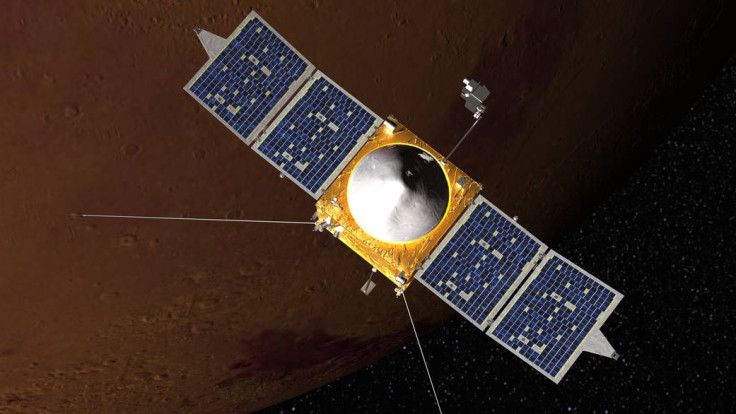Solar Wind Stripped Mars' Atmosphere And Turned The Red Planet Into A Barren, Cold Land

Billions of years ago, Mars was a lot like Earth. There was liquid water, as well as warm temperatures, which would have made the planet pretty suitable for life. But over time, Mars lost its atmosphere to become the cold, barren planet observed today. Studies released Thursday reveal the sun may have played a crucial role in stripping Mars of its once-thick atmosphere.
NASA's Mars Atmosphere and Volatile Evolution (MAVEN) spacecraft has been busy analyzing the upper atmosphere of Mars since it arrived at the planet on Sept. 21, 2014. The MAVEN mission is primarily concerned with understanding the role atmospheric loss had in climate change on Mars. How Mars lost its atmosphere was a question that had several explanations. The atmosphere could have been frozen, or turned to rock, or escaped into space. MAVEN provides a conclusive answer: Solar wind carried the atmosphere away. The data collected by MAVEN resulted in complementary studies published in the journals Science and Geophysical Research Letters.
"We've seen that the atmospheric erosion increases significantly during solar storms, so we think the loss rate was much higher billions of years ago when the sun was young and more active," Bruce Jakosky, MAVEN principal investigator at the University of Colorado, Boulder, said in a statement.
During its first year of Martian observations, MAVEN was in orbit during a coronal mass ejection. This huge blast of plasma complete with its own magnetic field hit Mars March 8. MAVEN recorded the rate at which ions -- molecules with more or less electrons than the number of protons -- escaped into space. The spacecraft observed a substantial spike in escape rates on the side of Mars facing the sun. Solar wind speed also increased due to the solar event -- reaching speeds of 800 kilometers per second (around 497 miles per second). Models estimate an escape rate at least seven times higher than normal conditions.
The latest NASA Mars announcement may not be as exciting as the recent discovery of flowing water on the red planet, but it provides a possible explanation about the evolution of Mars. Early in the history of the solar system, the sun may have been belching out plenty of coronal mass ejections that stripped away Mars' atmosphere, resulting in climate change.
"As these early periods may have been the dominant times at which the Martian atmosphere experienced loss, the inferred climate change on Mars may have been driven to a large extent by these solar storms," the authors of the study published in Science said.
© Copyright IBTimes 2024. All rights reserved.





















